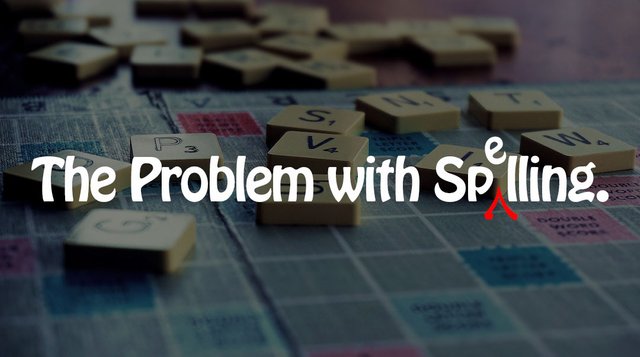The Problem with Spelling

Hi there folks. I hope you're doing well out there. I'm going to use this post to offload a little. I hope you don't mind. I've got a few things that have been floating around in the old brain of mine, and one in particular has me preplexed. I've been mulling this over for a while now, but about a week ago, I had a dream that somehow reminded me of this concern, and now that I have such a wonderful place to air these concerns, I thought I might take the liberty to share it with you. As usual, I don't profess to have all the answers, and you may well be inclined to think that, in this instance, I don't have any, but I'd like to present my case anyway!
Before we get into it, let's analyse a scenario quickly, shall we? Assuming you have your drivers licence, and assuming that the methods for getting them are similar in most countries, this should work quite well. Now, in South Australia, when we get our driver's licence, there are a few hoops, I mean processes, we have to take. I'm old, well, older, so I know the process has become a little stricter since I went through it, but back in my day, we needed to first pass a written test. This allowed you to get onto your Learner's permit.
During this time, you would practice driving with a fully licenced person - such as your Mum, Dad, or other responsible adult - in the front passenger seat. You would also take lessons with a government appointed qualified driving instructor. These instructors have been appointed to these positions because they have passed certification that states they have an exact knowledge of the road rules and are able to instruct learning drivers how to safely and accurately use the roads.
Suppose, though, that these 'qualified' instructors had not been tested correctly. Suppose that they missed the test on how to negotiate a round-a-bout, and were released onto the public to teach young people. These learners, who have little to no experience in driving, are relying on the 'qualified' instructor to teach them properly, but because they missed the round-a-bout test, how can they possibly teach them the road rules with any real certainty? Because of a lack of correct certification, when they taught the hundreds of learning drivers that come into their care, thay taught them incorrectly, sending them into the path of other drivers. And I'm sure you don't need me to explain the rest.

Onto The Concern

So why the scenario, Steve? Well, I thought that it illustrates quite well the concern I have. As alluded to in the opening paragraph, this concern is growing on me, and has been for probably six or seven years now. I have also alluded to this in one or two of my other posts, but am thinking that perhaps it deserves a place all of its own. You see, the scenario above describes the problem with instructors - educators, if you will - being sent out into the wide world, and guiding pupils when they are underqualified, and as such, educating them poorly, or worse, incorrectly.
Now, before you jump up and down and become indignant, I'm not saying that you, or any teacher you know, is not doing a good job - I know the environments we find ourselves in each day, and the often difficult circumstances we can face, so I am definitly not saying that. And I'm certainly not going to be generically sweeping my hand across the entire education system worldwide. No, I'm referring to one very small aspect of only some teacher's kitbags. The bit that is concerned with spelling.
I think it would be fair to say that spelling is a problem today. The younger generations have been struggling with spelling correctly for quite some time now. I've noticed a steady decline since my inception as a teacher eleven years ago, and I fear that we may have reached a point of no return, one where there has been too much water taken on board and bailing is now of no consequence. I could be wrong on that idea, but it seems that spelling problems are so rife in our schools that we can possibly not recover from the damage that has been caused.
I found myself, just the other day, marking some assignments, and correcting every second or third word in most of the submissions, and I got to wondering, when did we turn the corner? When did we (students, adults, society) stop caring about something as basic as good spelling and grammar? Now, my disclaimer here is, that I know I'm using generalities in some instances, and that there are still plenty of us who do actually care about spelling, grammar, and basic educational concepts such as this, so please don't think I've comepltely lost all hope (why would I be writing this otherwise!)! It would also be fair to say at this point, that not all students are bad spellers. In fact, in my years as a teacher, I've come across some students who are darn good at spelling too.

How Did This Begin?
I think this is one of those problems that has slowly snuck up on us. It has been occuring slowly - so slowly, that it's not until it's almost too late that it is noticed. There is no real point at which we can stop and say: Oh! That was it. That's the exact moment that spelling and grammar went down the toilet! No, unfortunately, it's a little less black and white than that. However, I do have a couple of theories that I'd like to put forward. The first is that we are now seeing a generation of poor spellers moving into positions where they can teach their bad habits to others (much like in the scenario presented earlier). The second is that there is no (or little) accountabiliy for today's student(s). Let's unpack these a little bit more.
When I was a first year teacher, I remember being quite astounded at how poor spelling and grammar was amongst the student body in general (yes, even back then I could see that we might be in trouble). You can imagine the usual suspects: 'There over their!', 'I cant believe I got a pour grade', and the examples could go on! Some of those responsible for the poor skills I encountered were in Year 12 at the time, and some of those students graduated and went on to university to study teaching. They no doubt took their poor spelling and grammar with them, and desipte lecturer's (and earlier on, teacher's) efforts, have continued on into the education profession with the same poor skills I came across when they were in Year 12 only four years prior. Now, they are passing their poor skills onto entire new generations of young people. I hope I explained that concern in an understandable manner - does it make sense? I guess, to try and put it more succinctly: students that I've taught who had poor spelling and grammatical skills are now working as teachers, passing on those bad habits to new generations of kids.
I'm also concerned that there is not enough accountability for students today. When I was at school, I was terrified of failing, but today, there simply doesn't seem to be that fear. Students know that they will make it to the next grade at the end of each year, often regardless of how much work they've actually completed, or how much they've actually learnt. Where is the motivation? Where is the drive? Why would you try to improve if you don't have to? Especially when you are young. At that age, I don't believe, except for the really exceptional students, that there is the maturity needed to see the benefits of self-improvement. This means that often, students will spend their entire school life, not needing to rectify their bad spelling and/or grammar. And then the circle begins again, compounding the issue further.

Is There a Solution?

I'm sure there is a solution. I'm sure there is something that can be done, but I'm again, afraid that maybe the boat has sailed. Have we thrown the proverbial baby out with the bath-water? I know that in South Australia, at least, pre-service teachers are now required to pass a spelling and grammar test before they can graduate into the classroom. This is one solution, but I'm unsure as to how stringent they are in not allowing students to pass, and the other problem with a test is that it is a 'flash in the pan'. It's not difficult to remember something for a short period of time - long enough to pass a test, for example. And then what happens to that knowledge you crammed in? Research suggests that it is slowly pushed out as new knowledge replaces it.
I also fear that a culture of non-failure has invaded society to the point where reneging on automatic graduation at the end of each school year is now too difficult. But if that is the case - if it is just simply too difficult, and not a matter of legality - what's to say that experiencing failure wouldn't have students suddenly taking notice. If a school was to impliment failure at the end of a school year for certain 'infringememtns' that reasulted in repeating the current year level, is it likely to have students scrambling to rectify whatever it is they needed to, in order to ensure that they could remain with their classmates and friends the following year? Fail one for the greater good of the many - I don't think a school would need to do it too many times before students realised the seriousness of the threat. But then the question is, who becomes the example when you're dicing with a child's sensibilities? Research also shows that holding students back a year level can actually be more debilitating than helpful. Like I said - there are solutions, but at what cost, and are they actually viable ones?

Conclusion and Thanks

Just by way of wrapping up, I hope that you understand my concern here, and not misunderstand and think I'm having a dig at teachers. As I stated earlier, I understand the trials that teachers can face - I'm standing at that same coal face day in, day out. My concerns are that generations of students are not getting the basic spelling and grammar skills that should be so important - even (maybe especially) in today's environment of spell checkers, and easy solutions. There is no substitue for knowing how to do something rather than relying on others to do it for you. Who knows, by knowing how to spell, the person you may help could be yourself.
Thanks for reading. As mentioned at the commencement of this post - it was more of an offload than anything highly educational or intellectually stimulating, but if it managed to generate some conversation around what I really believe is a major problem in society now, then I'm glad.
Please feel free to have your say below. I'd love to hear from you and get your thoughts or ideas on anything you've read here. Maybe you have a solution to share? Or perhaps you completely disagree (or agree) with my concerns. Do you have experiences similar to what you've read here, or are you currently training to be an educator and have something to input? Whatever it is, I'd love to get your point of view or idea(s).
Of course, the irony is that I've probably missed some spelling errors, or something isn't grammatically correct! Feel free to point this out too. Thanks again for taking the time to read this - it is appreciated.


Join us @steemitbloggers
Animation By @zord189

It's a lack of recreational reading.
The more you encounter a word the easier it is to spell correctly.
It doesn't need to be books, it can be articles here; it just needs to be a priority, and the spelling and grammar will come naturally.
If I taught English I'd set an assignment where students needed to blog on a weekly basis, and they could use this platform as the blogging site. Imagine their delight at completing an assessment and having the excitement of seeing if they would get paid for it too. Might actually hold the interest of some of the less engaged students.
Kicks the old chestnut, When are we going to use this in real life?
Also how the platform grows; I'd like to thank child labour laws for providing us a supply of bloggers with no other source of income.
There have probably always been people who struggle with spelling anyway, but I do wonder if people place a lack of importance on it now. A story of throw away, "you know what I mean!" rather than trying to make the effort to improve their spelling. If spelling doesn't come easy to you, then you have to find it important enough to make that effort to learn it. Something that I certainly had to do.
I also think it extends to knowledge of the meanings of similar words. Some can sound similar, but mean almost the opposite. I often wonder how some people would fare in legal proceedings when they fail to check correct word usage in making up forms. I had to laugh when a form for a competition entry stated that "entries will not be excepted without payment." It was tempting not to send payment!
I know many hate the "grammar Nazis" and having grammatical errors pointed out, but in legal circles they're not going to let things lie, it doesn't matter how much you say it's not important, or "You know what I meant."
Having said all this, a part of me does wonder if this is how the English language evolves. People deciding it's okay done a different way and then passing on their version of it to others. Just like how the meanings of words evolve as we use them differently or in colloquial terms. However, I gather that law doesn't evolve and original meanings are still used.
Posted using Partiko Android
I do agree with this. We are at a point now where finding the shortest way of communicating is becoming the norm. How easy is it to now write a coherent sentence using just emoji?!
I know a few years back, as SMSing became popular, some teachers developed units around the language of SMS, focusing in the different acronyms that were used. Obviously, today we have Twitter, where you need to find ways to keep your content as short as possible, and I also know of teachers who use this platform for teaching students how to write in less than 140 characters.
It's no wonder they struggle when they are taught to use ppl instead of people. I've had students actually write acronyms in essays and reports before. Imagine my horror/amusement to see a student use lol in a formal essay!!
That reminds me of when a lad in our class in the Bill and Ted era used "bogus" in his story for English! It wasn't exactly a word that ever caught on in England, but I guess it shows how youngsters are influenced.
Down here in the South we spell it, Colohkweel.
I think you’ve touched on something waaaay more widespread than spelling. Most concerning to me, adults who never learned how to get along with people who disagree with them are now raising children who will never learn to get along with people who disagree with them. What’s the fix for that?
This is a really good point. I hadn't really stretched my concern to issues such as this, but you are absolutely correct. I guess we are likely to see these issues raising their heads more and more as younger generations become parents, teachers, or take on other positions of responsibility.
Congratulations @steveblucher! You have completed the following achievement on the Steem blockchain and have been rewarded with new badge(s) :
Click on the badge to view your Board of Honor.
If you no longer want to receive notifications, reply to this comment with the word
STOPDo not miss the last post from @steemitboard:
Good points, and a great concern. My 15-year-old granddaughter said her teachers don't worry about spelling and don't teach it because their philosophy is that computers and word processors now come with spell check. Since they can run their spelling through a spell checker so easily, there's not need to know how to spell.
I have a problem with this for several reasons. First, spell checkers don't check the correct use of a word. For instance, "there," "their," and "they're" are all correct spellings, but it matters as to the context which one you use.
Secondly, what happens if they can't get access to a spell checker or the spell checker misses usage problems such as the above, and their spelling is reflective of how they might be judged professionally? A person may not need to know how to spell to obtain a certain position with a company, but good spelling will reflect on them positively at any rate.
Thirdly, what if some cataclysmic event renders all electronics inoperable? I have the same issue with calculators. People today suck at math because they've come to rely too much on calculators. I think it's necessary to know how to do your own mental work even if you don't have to.
I tend to agree with all of that @blockurator. I hadn't really paid a great deal of attention to the Maths side of things, but you're right. I teach Year 7 Maths, and we rarely allow the use of calculators, but by the time they get to Year 10, they are expected to have one of those graphics calculators. Pretty much does everything for them, so I guess we have to hope that they learned enough during the punitive years and are able to carry that for the rest of their lives.
I am in no way of claiming to be a teacher and to know everything that is going on aside from being a parent. With that I would like to add that a lot of people rely on their smartphones to correct all their mistakes, becoming lazy and just pressing on the screen for the quick fix. That's just one thing I wanted to point out.
Many other things come into play but things are so different in other countries, provinces and states that what goes on for my kids may just be so completely different for another.
Spelling is a huge thing that I tried fighting the school system with and I failed at doing so. The teachers are teaching our young ones to write with sounds. For example to write the letter 't', the line going down would make the sound shtook and the line crossing could be tonk. I don't really know what it is. If it works, great! But the problem here is that us parents don't know what these sounds are and they are and we are not allowed to know what they are because of copyrights. WE ARE NOT ALLOWED TO HELP OUT CHILDREN LEARN TO WRITE. We are recommended to let the teachers do it as to not mix the child up when learning how to write these letters. It's absurd!
And then the school system is removing (if they haven't done it already) the teachings of cursive writing.
There is so much to write about this topic where I wouldn't even know how to end the conversation right and just let it be.
But I must say this, and leaving you with this: When was it decided that the parents can no longer help their children learn?
....It is so hard to not continue on what the schools take away... but that is for another time.
Take care, and great post! You brought up some serious things for people to think about.
It sounds like you're in between somewhat of a rock and a hard place, @foxyspirit. I would've thought that a child learns best when there is a common goal between the teachers and the parents. A school that tells parents not to be a part of their child's education is possibly being a little short sighted.
Thanks for reading and for commenting with such a heart-felt response. Just to address your final comment, I don't think that it has been decided that parents can't help their children learn anymore. As I said - children of a school age will likely learn the best when teachers and parents are working together to help them achieve their best possible outcomes.
That is exactly what I was thinking. But everything is so backwards. Here it is like our privileges are taken away as parents as soon as we hand our children over to them yet no one is looking at the big picture. See the kids are using smart devices already at a young age. I only found out about this last year when they sent some pictures to us through email. I dont let my kids play with tablets even if it is about learning. I am trying to keep them away from so much screen time at home. Just opinions there I guess and the world is evolving so we have to go with it whether we like it or not.
And just to add another example of how we are being detached from our kids; I tried seeking help with our health care services some time ago for my son. He had/has some destructive behavior in which I am trying to find the source. I met up with our nurse practitioner and she told me that she didn't have the means to advance in testing him for anything. She told me that I had to go through the school and it is the teacher that will tell me if something is wrong with my child. I was to go fill out papers with them, which would put us into the hands of child protective services automatically. Why would I need someone else to tell me what is wrong with my child? I am the one raising him and doing everything possible with him. A teacher that teaches him how to read, write, do math, science and teaches him to sit down for the longest part of the day will know more than me about my own child? Yet health services that is made for this won't do anything unless the school and teachers say it is ok to do so.
I have been talking to my husband about homeschooling recently. It is the only way I feel I can protect my child, teach him in a good environment and have control over what is going on. I hope it is not like this in other places. It is so important that the parents are able to e involved with their kids and what goes on in school.
Sorry about all this. It is very upsetting and we, the people, the parents, can't change a thing.
Laziness definitely comes into the equation. A great deal of students (even adults today!) have learned somewhere along the way that laziness is okay.
This is an interesting idea. I don't think I'd really thought about this one too much, but I can see what you're saying. After all, if you don't care about being understood, why do you need to bother gaining the skills required?
Thanks for stopping by @thekittygirl.